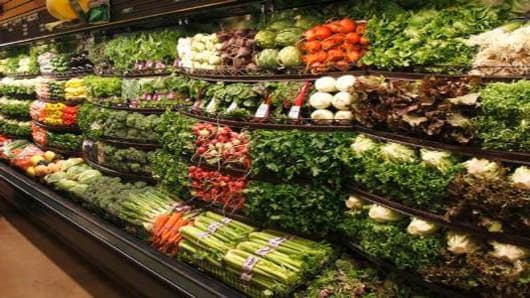In the UK, top retailers have fared slightly better. Number one Tesco is down 5 percent, while its arch-rival Sainsbury's , the third-largest, fell just 2 percent year-on-year. Fourth-largest Morrisons fell 9 percent.
"They are having to work extra hard to flaunt their value credentials," Natalie Berg, Grocery Research Manager at Planetretail, told CNBC.com. "Competition in the grocery sector has become exceptionally fierce."
Heightened competition, according to Berg, has made strong value proposition a must for supermarkets to stay viable.
"Value — or at least the perception of value — remains the most important strategy for supermarkets," she said. "Those supermarkets with even the slightest price perception issues are in for a difficult time."
Of course, changing the perception that your prices aren't as low as somewhere else doesn’t happen overnight, Berg added. This has hurt premium retailers such as Whole Foods and Marks & Spencer , as well as middle-range retailers such as Supervalu in the US.
Advertising Is Key
Despite the economic crisis, advertising has become increasingly important, another retail analyst said. A supermarket with good public relations and a strong marketing team will usually find more success when consumers are being more frugal.
Sainsbury’s in particular has seen great success with its PR campaign, including the Channel 4 program "I’m Running Sainsbury’s" — where floor staff are encouraged to come up with ideas to run the supermarket — , and promotion surrounding its 140th anniversary.
"Advertising (for Sainsbury’s) has been very strong, which is a weakness for Tesco at the moment," Nick Bubb, retail analyst at Pali International told CNBC.
Supermarkets are also becoming savvier when it comes to understanding their shoppers. Retailers are increasingly looking towards consumer data to help determine what and how consumers buy from their shelves.
"Tesco and Kroger have fared well during the recession not only because of their low-price image but also because of their ability to analyze, interpret and respond to shopper data," Berg said. Both companies use the marketing company Dunnhumby to help analyze consumer data.
"It’s this kind of shopper understanding that will set apart the winners from the losers going forward,” Berg added.
Brand Casualties
Many consumers are trading down to cheaper stores, and are becoming more confident due to the amount of information available on the Internet. Price comparison sites such as mysupermarket.co.uk are becoming invaluable to price-minded consumers.
Another casualty in the recession has been name brands. Brands count for about 75 percent of sales in the US, while only 50 percent in the UK. They increasingly have to compete with supermarkets’ private labels for shelf space, as the private labels typically offer the same quality at a 25 percent lower price than the name brand.
And if retailers want to keep the customers they have gained during the recession, price cuts are not enough: quality is still paramount. Sainsbury’s in particular has positioned itself as the retailer offering quality food at fair prices, gaining customers from premium retailers such as M&S and Waitrose.
"Consumers are still after quality food during a recession," Berg said. "In fact, you could argue that quality food is actually more important during a recession as consumers spend more time cooking at home."
Some retailers are already moving to expand. Sainsbury’s recently posted a 7.8 percent growth in sales for the first quarter of 2009, and announced plans to expand its services throughout the UK.
"We see lots of opportunity out there at the moment to both develop our existing stores…and also to open new stores," Sainsbury’s CEO Justin King told CNBC.


